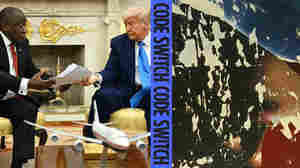Want to level up your Code Switch game? Try Code Switch Plus. Your subscription supports the show and unlocks a sponsor-free feed. Learn more at plus.npr.org/codeswitch

Code Switch
From NPR
What's CODE SWITCH? It's the fearless conversations about race that you've been waiting for. Hosted by journalists of color, our podcast tackles the subject of race with empathy and humor. We explore how race affects every part of society — from politics and pop culture to history, food and everything in between. This podcast makes all of us part of the conversation — because we're all part of the story. Code Switch was named Apple Podcasts' first-ever Show of the Year in 2020.
Want to level up your Code Switch game? Try Code Switch Plus. Your subscription supports the show and unlocks a sponsor-free feed. Learn more at plus.npr.org/codeswitch
Most Recent Episodes
From pee-wees to the pros, what football tells us about race in the U.S.
From pee-wees to the pros, what football tells us about race in the U.S.
Collage of football players falling, helmets and footballs. Jackie Lay hide caption
Are we safe? How 'copaganda' makes the case for investing more in police
Are we safe? How 'copaganda' makes the case for investing more in police
South African President Ramaphosa meets President Trump amid tensions over Washington's resettlement of white Afrikaners that the U.S. president claims are the victims of "genocide." Jim Watson/AFP via Getty Images hide caption









